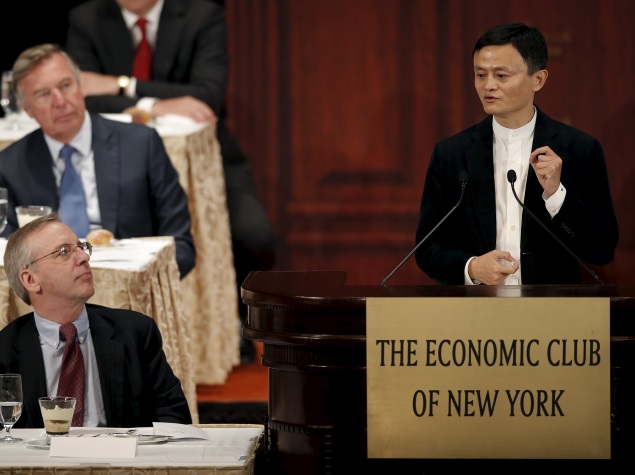- Home
- Internet
- Internet News
- Alibaba's Ma, Visiting New York, Says Not in America to Compete
Alibaba's Ma, Visiting New York, Says Not in America to Compete

Ma is visiting the United States this week to explain Alibaba's global strategy and to "help dispel misconceptions" about the company, spokesman Greg Jenkins said in an email.
"We're not coming here to compete," Ma told the Economic Club of New York on Tuesday.
The vast bulk of Alibaba's revenue comes from its dominant domestic online marketplaces, but the company has been investing aggressively in a range of sectors abroad.
Still, it has taken what amounts to a conservative approach to expanding in the United States, contrary to industry speculation that it may be plotting a direct assault on U.S. soil after its record-breaking $25 billion IPO in September.
Ma said he is regularly asked when Alibaba will "invade" America and do battle with Amazon Inc and ebay Inc. Last year, the company debuted a small direct-to-consumer U.S. portal, 11Main.com, which is a collection of Internet storefronts for smaller businesses.
"The opportunity and the strategy for us is helping small business in America go to China, sell their products to China," Ma said.
The future for Alibaba is in building out its e-commerce infrastructure beyond China's borders, he said.
In the first three months of the year, Alibaba's revenue from China commerce grew 39 percent to $2.2 billion. International commerce grew 27 percent to $264 million and only accounted for 9 percent of revenue, compared with 11 percent in the same period a year earlier.
Alibaba says some of its larger overseas markets include Brazil and Russia. The company and its affiliates are also making overtures in India.
© Thomson Reuters 2015
For the latest tech news and reviews, follow Gadgets 360 on X, Facebook, WhatsApp, Threads and Google News. For the latest videos on gadgets and tech, subscribe to our YouTube channel. If you want to know everything about top influencers, follow our in-house Who'sThat360 on Instagram and YouTube.
Related Stories
- Samsung Galaxy Unpacked 2025
- ChatGPT
- Redmi Note 14 Pro+
- iPhone 16
- Apple Vision Pro
- Oneplus 12
- OnePlus Nord CE 3 Lite 5G
- iPhone 13
- Xiaomi 14 Pro
- Oppo Find N3
- Tecno Spark Go (2023)
- Realme V30
- Best Phones Under 25000
- Samsung Galaxy S24 Series
- Cryptocurrency
- iQoo 12
- Samsung Galaxy S24 Ultra
- Giottus
- Samsung Galaxy Z Flip 5
- Apple 'Scary Fast'
- Housefull 5
- GoPro Hero 12 Black Review
- Invincible Season 2
- JioGlass
- HD Ready TV
- Laptop Under 50000
- Smartwatch Under 10000
- Latest Mobile Phones
- Compare Phones
- Lava Yuva 2 5G
- OnePlus Ace 5
- OnePlus Ace 5 Pro
- Oppo A5 Pro 5G
- Vivo Y29 5G
- Honor Magic 7 RSR Porsche Design
- Moto G15 Power
- Moto G15
- Asus Zenbook S 14
- MacBook Pro 16-inch (M4 Max, 2024)
- Honor Pad V9
- Tecno Megapad 11
- boAt Enigma Gem
- boAt Enigma Daze
- Sony 65 Inches Ultra HD (4K) LED Smart TV (KD-65X74L)
- TCL 55 Inches Ultra HD (4K) LED Smart TV (55C61B)
- Sony PlayStation 5 Pro
- Sony PlayStation 5 Slim Digital Edition
- Blue Star 1.5 Ton 3 Star Inverter Split AC (IC318DNUHC)
- Blue Star 1.5 Ton 3 Star Inverter Split AC (IA318VKU)

















